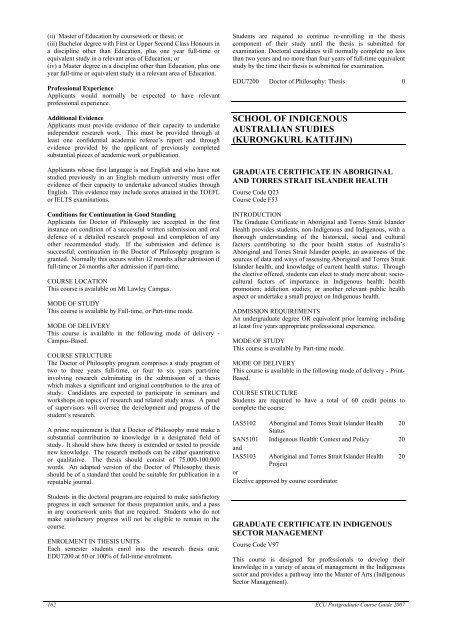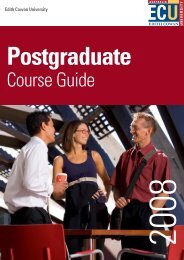Course Guide - Edith Cowan University
Course Guide - Edith Cowan University
Course Guide - Edith Cowan University
Create successful ePaper yourself
Turn your PDF publications into a flip-book with our unique Google optimized e-Paper software.
(ii) Master of Education by coursework or thesis; or<br />
(iii) Bachelor degree with First or Upper Second Class Honours in<br />
a discipline other than Education, plus one year full-time or<br />
equivalent study in a relevant area of Education; or<br />
(iv) a Master degree in a discipline other than Education, plus one<br />
year full-time or equivalent study in a relevant area of Education.<br />
Professional Experience<br />
Applicants would normally be expected to have relevant<br />
professional experience.<br />
Additional Evidence<br />
Applicants must provide evidence of their capacity to undertake<br />
independent research work. This must be provided through at<br />
least one confidential academic referee’s report and through<br />
evidence provided by the applicant of previously completed<br />
substantial pieces of academic work or publication.<br />
Applicants whose first language is not English and who have not<br />
studied previously in an English medium university must offer<br />
evidence of their capacity to undertake advanced studies through<br />
English. This evidence may include scores attained in the TOEFL<br />
or IELTS examinations.<br />
Conditions for Continuation in Good Standing<br />
Applicants for Doctor of Philosophy are accepted in the first<br />
instance on condition of a successful written submission and oral<br />
defence of a detailed research proposal and completion of any<br />
other recommended study. If the submission and defence is<br />
successful, continuation in the Doctor of Philosophy program is<br />
granted. Normally this occurs within 12 months after admission if<br />
full-time or 24 months after admission if part-time.<br />
COURSE LOCATION<br />
This course is available on Mt Lawley Campus.<br />
MODE OF STUDY<br />
This course is available by Full-time, or Part-time mode.<br />
MODE OF DELIVERY<br />
This course is available in the following mode of delivery -<br />
Campus-Based.<br />
COURSE STRUCTURE<br />
The Doctor of Philosophy program comprises a study program of<br />
two to three years full-time, or four to six years part-time<br />
involving research culminating in the submission of a thesis<br />
which makes a significant and original contribution to the area of<br />
study. Candidates are expected to participate in seminars and<br />
workshops on topics of research and related study areas. A panel<br />
of supervisors will oversee the development and progress of the<br />
student’s research.<br />
A prime requirement is that a Doctor of Philosophy must make a<br />
substantial contribution to knowledge in a designated field of<br />
study. It should show how theory is extended or tested to provide<br />
new knowledge. The research methods can be either quantitative<br />
or qualitative. The thesis should consist of 75,000-100,000<br />
words. An adapted version of the Doctor of Philosophy thesis<br />
should be of a standard that could be suitable for publication in a<br />
reputable journal.<br />
Students in the doctoral program are required to make satisfactory<br />
progress in each semester for thesis preparation units, and a pass<br />
in any coursework units that are required. Students who do not<br />
make satisfactory progress will not be eligible to remain in the<br />
course.<br />
ENROLMENT IN THESIS UNITS<br />
Each semester students enrol into the research thesis unit:<br />
EDU7200 at 50 or 100% of full-time enrolment.<br />
Students are required to continue re-enrolling in the thesis<br />
component of their study until the thesis is submitted for<br />
examination. Doctoral candidates will normally complete no less<br />
than two years and no more than four years of full-time equivalent<br />
study by the time their thesis is submitted for examination.<br />
EDU7200 Doctor of Philosophy: Thesis 0<br />
SCHOOL OF INDIGENOUS<br />
AUSTRALIAN STUDIES<br />
(KURONGKURL KATITJIN)<br />
GRADUATE CERTIFICATE IN ABORIGINAL<br />
AND TORRES STRAIT ISLANDER HEALTH<br />
<strong>Course</strong> Code Q23<br />
<strong>Course</strong> Code F53<br />
INTRODUCTION<br />
The Graduate Certificate in Aboriginal and Torres Strait Islander<br />
Health provides students, non-Indigenous and Indigenous, with a<br />
thorough understanding of the historical, social and cultural<br />
factors contributing to the poor health status of Australia’s<br />
Aboriginal and Torres Strait Islander people, an awareness of the<br />
sources of data and ways of assessing Aboriginal and Torres Strait<br />
Islander health, and knowledge of current health status. Through<br />
the elective offered, students can elect to study more about: sociocultural<br />
factors of importance in Indigenous health; health<br />
promotion; addiction studies; or another relevant public health<br />
aspect or undertake a small project on Indigenous health.<br />
ADMISSION REQUIREMENTS<br />
An undergraduate degree OR equivalent prior learning including<br />
at least five years appropriate professsional experience.<br />
MODE OF STUDY<br />
This course is available by Part-time mode.<br />
MODE OF DELIVERY<br />
This course is available in the following mode of delivery - Print-<br />
Based.<br />
COURSE STRUCTURE<br />
Students are required to have a total of 60 credit points to<br />
complete the course.<br />
IAS5102 Aboriginal and Torres Strait Islander Health 20<br />
Status<br />
SAN5101 Indigenous Health: Context and Policy 20<br />
and<br />
IAS5103 Aboriginal and Torres Strait Islander Health 20<br />
Project<br />
or<br />
Elective approved by course coordinator<br />
GRADUATE CERTIFICATE IN INDIGENOUS<br />
SECTOR MANAGEMENT<br />
<strong>Course</strong> Code V97<br />
This course is designed for professionals to develop their<br />
knowledge in a variety of areas of management in the Indigenous<br />
sector and provides a pathway into the Master of Arts (Indigenous<br />
Sector Management).<br />
162 ECU Postgraduate <strong>Course</strong> <strong>Guide</strong> 2007



